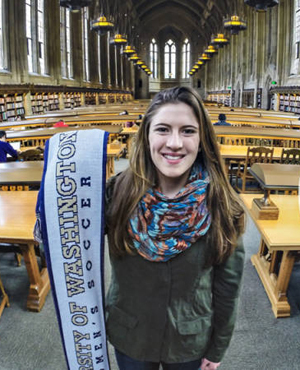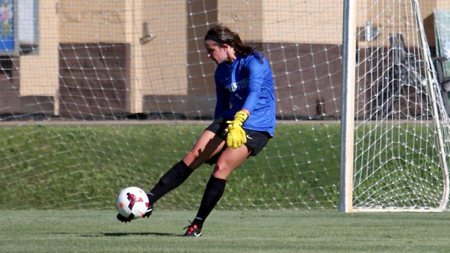As a high school student in Fremont, California, Megan Kufeld was known for her academic smarts, graduating as valedictorian. Few classmates realized that she spent hours each day playing soccer for a Bay area club team. But at the UW, as starting goalkeeper for the Husky women’s soccer team, Kufeld has found herself pegged as a jock rather than a scholar.
“In high school, everybody knew the smart kids, the AP kids,” she says. “At the UW, people see me as an athlete. It’s taken a while for people to realize that I take academics seriously.”

Seriously indeed. Kufeld, now a junior, has been named a UW President’s Medalist in recognition of exceptional academic achievement during her sophomore year. The medal is presented annually to the top student from the freshman, sophomore, and junior classes. Records indicate that Kufeld may be the first varsity athlete to ever receive the medal.
“When they told me I got the award, I was like, ‘Are you serious?’“ recalls Kufeld. “I know I do well in class, but the people around me do well too, so it was really kind of shocking to me.” The UW administrators who bestowed the honor were surprised as well—to learn that Kufeld was a varsity athlete. They were unaware of her soccer achievements when they selected her. It was her challenging course load and stellar GPA—a 3.95 for her sophomore year, and even higher now—that led to her medalist selection.
Kufeld’s schedule is particularly heavy on science courses. A biology major, she first became intrigued with science in seventh grade thanks to an inspiring middle school teacher. “I’m specifically interested in molecular and cellular biology,” she says. “I just think it’s so cool that things at the molecular level make us who we are. I find it fascinating how something as small as a protein can make you tall or give you a disease and that you can alter that by introducing something else like a molecular signal or engineered genetic information.”
Soccer was on Kufeld’s radar even earlier than science. She started playing at age five but didn’t become a goalkeeper until age twelve. “At first, I wasn’t interested in being goalkeeper,” she recalls, “but it turns out my personality really does fit. I’m very analytical. As a goalkeeper, you stand back there and are the eyes for the team. I can analyze what’s happening and recognize what our team is doing wrong and share that.” Last fall, in her first full season as UW’s starting goalkeeper, she allowed only 17 goals in 20 games, with 88 saves.
I’m an athlete and a dedicated student. I want people to realize that it is possible to be both.
Kufeld finds that the same qualities that help her succeed in soccer—being analytical, detail-oriented, driven, and committed—also help her succeed academically. “I’ll stick to something until I’ve really got it,” she says. “I never give just half an effort.”
If all this sounds like relentless hard work, Kufeld insists it is anything but. “Soccer is fun for me,” she says. “It’s my relaxation. I can be stressing all the way to practice, but all that goes away once I start warming up.” She also shrugs off concerns about balancing difficult courses with demanding sports commitments. “It’s what I’ve always done,” she says. “In high school, I spent the day taking AP classes and then went to soccer practice an hour away. At the UW it’s actually easier, since there’s less time spent in class and practice doesn’t require two hours of travel each day.” Kufeld does admit that her schedule is more challenging during soccer season, when the team often leaves for games on Thursday and doesn’t return until Sunday night.
Kufeld’s packed schedule just got even busier, with a new role as a research assistant added to the mix. She is working on cancer research in the lab of Edith Wang, associate professor of pharmacology. She found the position through the UW’s undergraduate research database. “It’s something I’ve been wanting to do for a while,” she says of her involvement in faculty research. “Right now I’m learning lab techniques. It’s been really exciting, since eventually this is a career path I’m interested in pursuing.”

Although Kufeld plans to attend graduate school in the biological sciences, she is hoping to play soccer professionally first. “I’m not ready to give up soccer yet,” she says. “I can probably only play until I’m 30. I can do science for the rest of my life.” Because the U.S. Soccer League only has eight teams, severely limiting the number of goalkeeper openings, Kufeld envisions playing in Europe, where every country has its own league.
And who knows? She may encounter other athlete-scholars on those teams as well.
“People make assumptions about athletes, and they’re often wrong,” says Kufeld. “A lot of times in class, I’d avoid presenting myself as an athlete because there can be a negative connotation. It’s better now that I’ve proven myself, but in the beginning it was frustrating. I’m an athlete and a dedicated student. I want people to realize that it is possible to be both.”
More Stories

AI in the Classroom? For Faculty, It's Complicated
Three College of Arts & Sciences professors discuss the impact of AI on their teaching and on student learning. The consensus? It’s complicated.

What Students Really Think about AI
Arts & Sciences weigh in on their own use of AI and what they see as the benefits and drawbacks of AI use in undergraduate education more broadly.

A Love of Classics and Ballroom
Michael Seguin studied Classics at the UW and now owns Baltimore's Mobtown Ballroom. The two interests, he says, are more connected than they might seem.